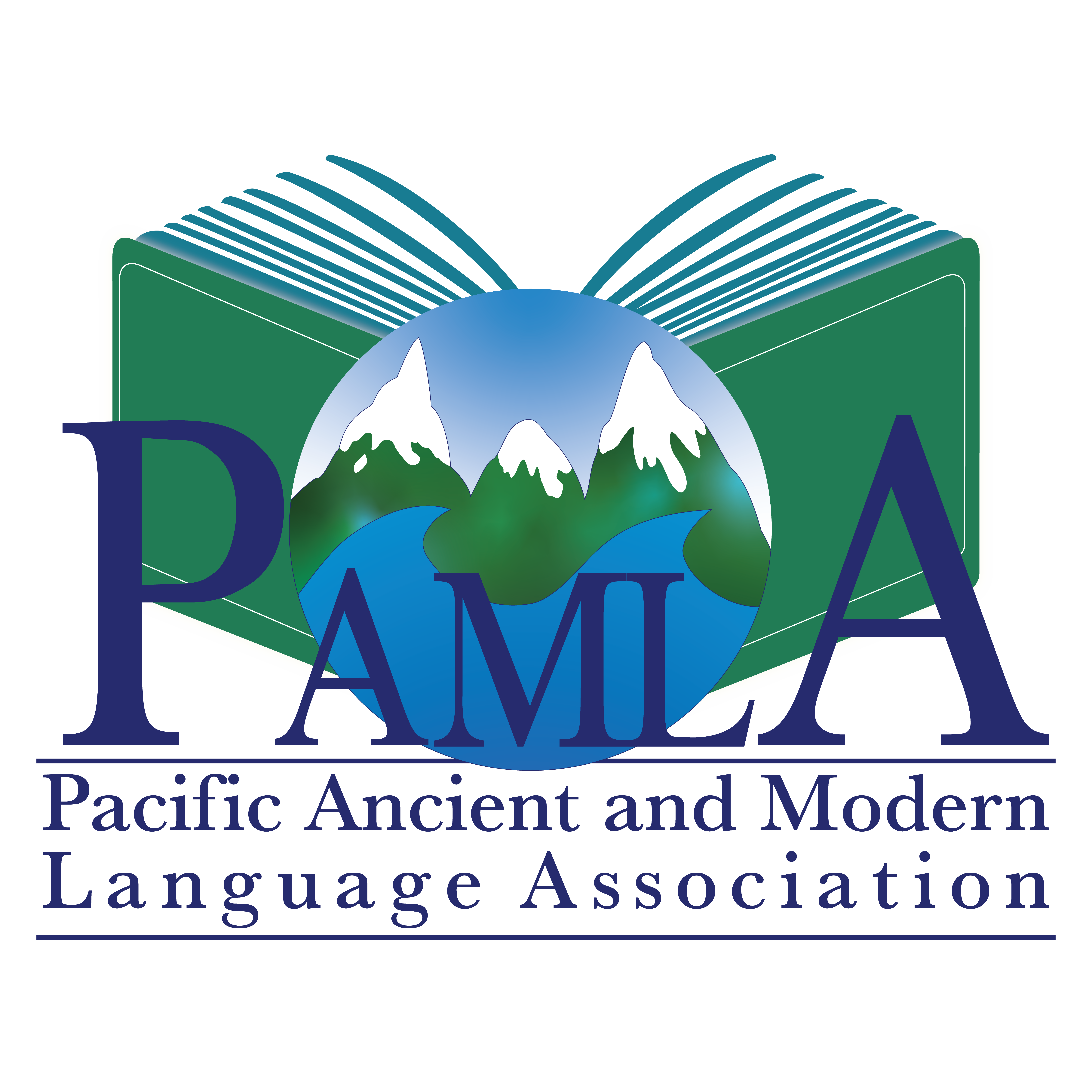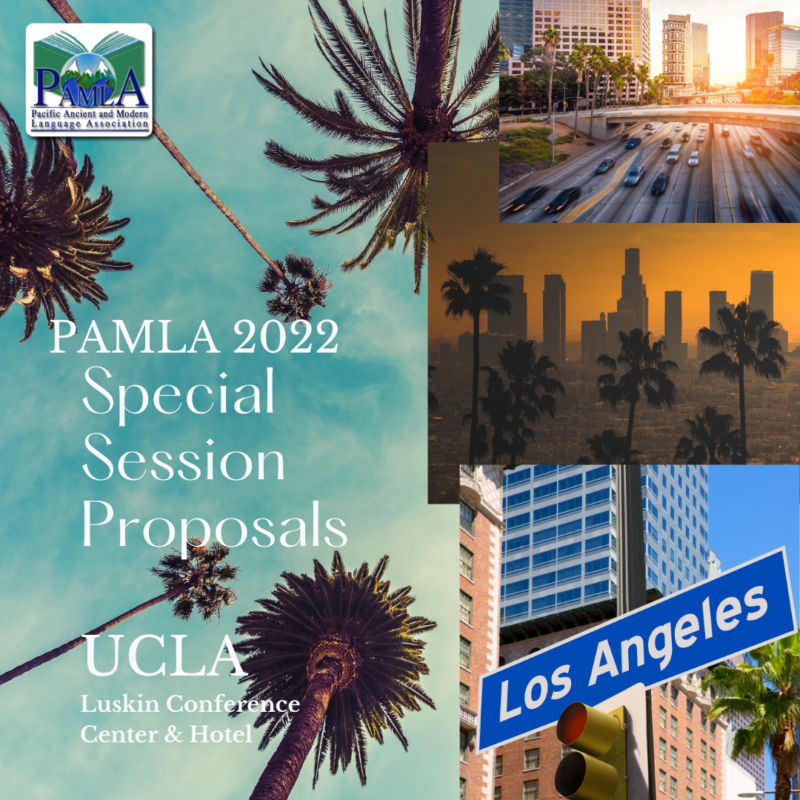Geographies of the Fantastic and the Quotidian: PAMLA 2022 Call for Special Sessions
PAMLA welcomes special session proposals for the 2022 PAMLA conference at the UCLA Luskin Conference Center and Hotel in Los Angeles, California (early morning Friday, November 11 through Sunday night, November 13, 2022) on topics of scholarly interest that are not too close to the topics of our general (standing) sessions. Our system for paper proposals will open in February 2022, with May 15 as the submission deadline.
While we welcome special session proposals on a wide variety of topics, we are particularly interested in special session proposals that engage with the 2022 PAMLA Conference Theme: Geographies of the Fantastic and Quotidian.
You can submit your proposal for a special session from now up to March 30: https://pamla.ballastacademic.com/
Our system for paper proposals will open in February 2022, with May 15 as the submission deadline.
As we converge on the magnificent, incomprehensible megalopolis of Los Angeles in November of 2022, it would be timely to consider the many “ecologies” of our lived spaces and places.[1] We might think dialectically in terms of clear, dynamic oppositions: exterior and interior spaces, for instance, or those we would categorize as real or surreal—or, perhaps to return to Los Angeles, “hyperreal.”[2] Within those texts we like to dwell—metaphorically at least, for the longue durée or for brief, eccentric interludes—as we discover that time intersects with space in surprising and contradictory ways.
The 2022 Special Theme invites our scholarly community to consider the overdetermined landscapes both of the imagination and of everyday experience. In the process, we hope collectively to interrogate the multiple topographies and topologies of our cherished narratives, for as Michel de Certeau reminds us, “stories … carry out a labor that constantly transforms places into spaces or spaces into places.”[3]
Los Angeles itself would certainly offer fertile ground for scholarly excavation, but we strongly encourage submissions that explore what Gaston Bachelard termed the “poetics of space” within texts of all sorts, as well as all sizes and varieties of context. Particularly fascinating might be explorations of the extraordinary, the exemplary, the “out of this world” sorts of places, real and figurative: the spaces of the fantastic and the bizarre. Conversely, the lived and experienced environments of the banal might spark equally fertile archaeologies of the everyday. For that is the allure of the often inscrutable or illegible cities of the imagination: they open up new territories.
We welcome special session proposals (due March 30, 2022) on any topic for our 2022 annual conference. Those that harmonize with our special theme might include all varieties of heterotopologies; explorations of fictional domains; Borgesian labyrinths; road narratives; enclaves of digital introspection or connection; theme parks; elision, caesura, and other grammatological openings; migration/border crossings; psychedelic “trips” of all sorts; native practices of tending the land; mirrors and projections; choreography and dance; exteriority/interiority; the politics or rhetorics of dispossession; theatrical staging; embodiment and disembodiment; panopticism; the family and/or spaces of domesticity; museums and archives; loitering; Zoom and other hauntings; homelessness and houselessness; settler colonialism; communities and cliques; as well as both paroxysmal places and quiet passages.
—
[1] To borrow a fitting phrase from the famed British/American architectural critic Reyner Banham, whose Los Angeles: Architecture of the Four Ecologies, when read today, projects an alluring, smog-shrouded palimpsestual map of a city which has been repeatedly rewritten over the half-century since its publication.
[2] Interestingly, both Umberto Eco’s 1973 “Travels in Hyperreality” and Jean Baudrillard’s 1981 Simulations reveal a fascination with Los Angeles, and particularly Disneyland, as the epicenter of a [seemingly] quintessentially American tendency to sanctify the fantastic.
[3] It might seem outlandish to evoke Michel De Certeau’s spatial rhetorical practice of “walking in the city” within the paradigmatic autopia of Southern California (The Practice of Everyday Life, 118, 91), at least in the shadow of the New Wave/Punk pop eloquence of Missing Persons’ 1982 slightly vicious ditty. But, as Jane Jacobs teaches us in The Death and Life of Great American Cities, the intricate “sidewalk ballet” of neighborhoods, large and small, routinely transcends the pedestrian (66).
*PAMLA encourages special session proposals with alternative formats, such as roundtables, workshops, creative conversations, etc.; PAMLA encourages session proposals that will welcome paper proposals from a wide variety of scholars, not just scholars from the presiding officer’s host institution.
*PAMLA hosts the following General/Standing Sessions (So please make sure that your special session proposal does not merely replicate the topic of one of these existing General/Standing Sessions):
21st-Century Literature; Adaptation Studies; African American Literature; American Literature before 1865; American Literature 1865-1945; American Literature after 1945; Ancient-Modern Relations; Architecture, Space, and Literature; Asian American Literature; Asian Literature; Austrian Studies; Autobiography; Bible and Literature; British Literature and Culture: To 1700; British Literature and Culture: The Long Eighteenth Century; British Literature and Culture: The Long Nineteenth Century; British Literature and Culture: 20th and 21st Century; Children’s Literature; Classics (Greek); Classics (Latin); Coalitional Feminisms; Comics and Graphic Narratives; Comparative American Ethnic Literature; Comparative Literature; Comparative Media; Composition and Rhetoric; Creative Writing; Critical Theory; Disability Studies; Disney and Its Worlds; Drama and Society; East-West Literary Relations; Film and Literature; Film Studies; Folklore and Mythology; Food Studies; French; Gay, Lesbian and Transgender Literature; Germanic Studies; Gothic; Indigenous Literatures and Cultures; Italian; Italian Cinema; Italian Ecocriticism; Jewish Literature and Culture; Latina/o Literature and Culture; Linguistics; Literature & the Other Arts; Literature and Religion; Medieval Literature; Middle English Literature, including Chaucer; New Italians; Oceanic Literatures and Cultures; Old English Literature, including Beowulf; Poetry and Poetics; Post-Colonial Literature; Religion in American Literature; Rhetorical Approaches to Literature; Romanticism; Scandinavian Literature and Culture; Science Fiction; Shakespeare and Related Topics; Spain, Portugal, and Latin America: Jewish Culture & Literature in Trans-Iberia, Spanish and Portuguese (Latin American); Spanish and Portuguese (Peninsular); Teaching with Media and Technology; Teaching Writing Across the Disciplines; Television Studies; Travel and Literature; Video Game Studies; Western American Literature; Women in Literature; Young Adult Literature and Culture.

